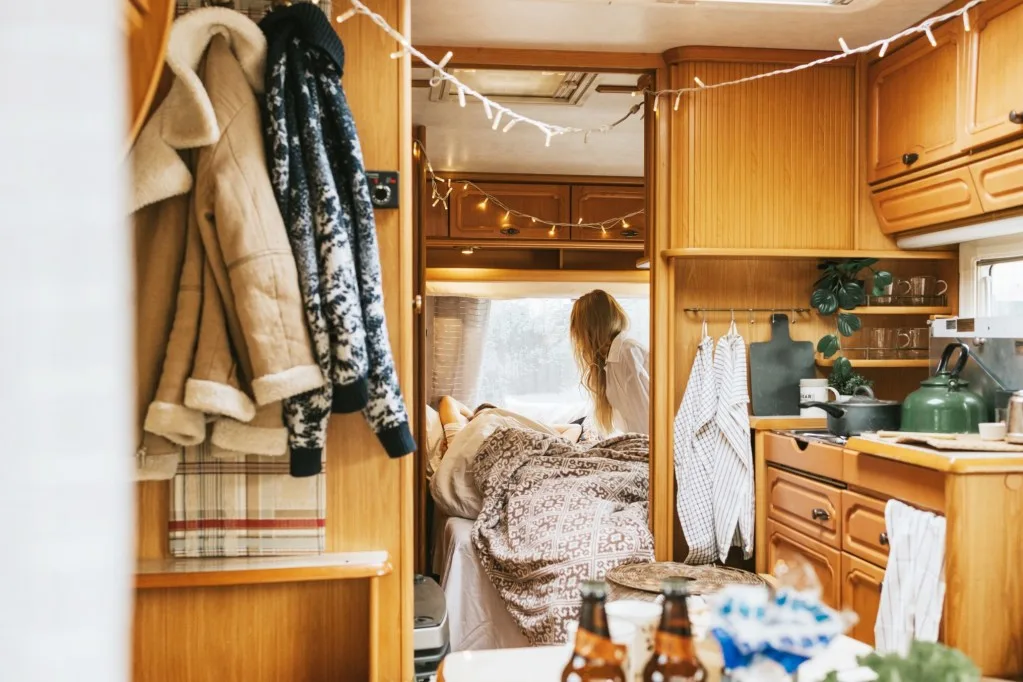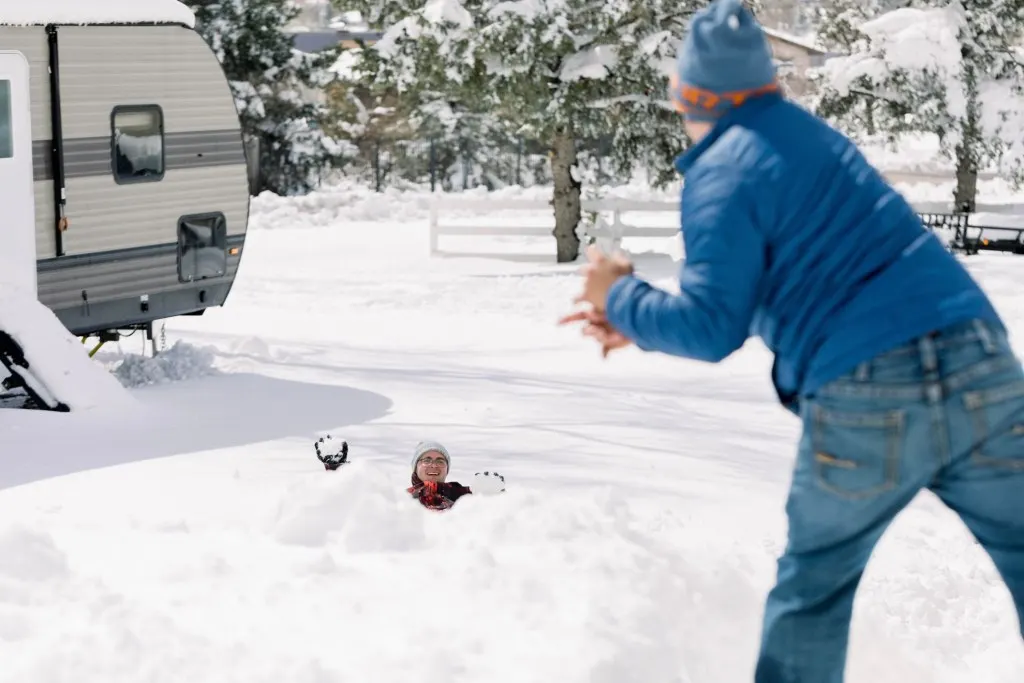With rising home values and rental properties increasing in demand, renting costs have skyrocketed across the country. Many who jumped into RV life in the last couple of years may find solace in staying put instead of attempting to test the chaotic waters of renting.
It may take some adjusting, but stationary RV life might be the cure for the out-of-control rental market. So make sure you read this before you sign an expensive lease.
Let’s get started.
Can You Live in RV Stationary?
Many full-time and part-time RVers live stationary in their RVs. And a lot of RV parks and campgrounds allow RVers to purchase or rent a spot to park their rig long-term. Some locations are only available seasonally, but you can find spots to live in your RV year-round.
Living stationary in an RV requires more effort than living in a residential home. Like a standard home, you’ll still have maintenance to do on an RV to keep it in good order.
However, getting water and dumping tanks requires a bit more thought. The best spots for being stationary in an RV will have direct access to water, power, and a sewer dump without moving the RV.
Is It Financially Smart to Live in an RV?
Living in an RV can be a smart financial move in some circumstances, but not always. It can be a no-brainer for those who already own an RV and can legally live on land they own. However, heating and cooling can get complicated and extremely costly, especially in an area with extreme summers and winters.
However, it’s not always a good financial decision if you don’t already own an RV or will have to pay for a spot to park it. RVs are incredibly expensive, especially if you want one built to handle all-weather camping. Add an RV payment with the costs of a long-term RV spot, and you could easily find yourself spending just as much as you would renting a decent apartment.
RV life isn’t easy, and things break frequently. To keep an RV in good condition, especially one used for full-time living, requires constant maintenance. Many RV systems can’t handle the constant wear and tear of full-time use.
So deciding whether living in an RV is a good financial decision will require you to consider a tremendous amount of expenses and how much you would save.
For some people, the stability and comfort of a home or apartment may be worth spending a couple of hundred extra bucks each month.
Pro Tip: Prepare your budget by learning more about How Much Do RVs Cost?

How Much Does It Cost to Live Stationary in an RV?
The cost of living in an RV depends on your situation. The prices will be much less if you already own the RV and have land where you can legally live in it. However, if you have a monthly RV payment, need to pay for a long-term campsite, and live in a climate less than ideal for RV living, it will be more costly.
Depending on the rig, an RV payment can easily cost $200 to $500 per month. Costs for a long-term campsite will vary considerably in various parts of the country. Some locations in Florida and Arizona will even have seasonal rates that skyrocket during peak season.
Depending on the amenities and location, these sites can cost $600 to $1,000 per month. Additionally, most long-term campsites require RVers to pay for their electrical usage.
Considering these expenses, you could easily spend $1,500 to $2,000 monthly to live stationary in an RV. However, if you own the land or have a paid-off RV, your living expenses would only include water, sewer, and electrical usage. In these situations, you could only spend a couple of hundred bucks or less each month.
Is It Cheaper to Live in a House or RV?
You must consider several factors when deciding whether it’s cheaper to live in an RV instead of a house. You can’t just park your RV anywhere and live in it. Some areas even restrict where you can park them and how long. Living in an RV is often cheaper in areas with insanely high prices for buying or renting homes, which seems like most places these days.
In many urban areas, a budget-friendly long-term campsite costs upward of $800 to $1,000 per month. You can save quite a bit of money by finding rural areas that have long-term campgrounds.
Many RVers discover that a large chunk of the savings from living in an RV often gets eaten up by increased electrical costs from trying to keep their RV comfortable in the summer and winter.
However, in many places around the country, living in an RV is much cheaper than living in a house. However, it’s not always the case, and you need to find a budget-friendly spot to maximize your monthly savings.
Pro Tip: We got to the bottom of whether or not Cheap RV Living Is Fact or Fiction.

What Are the Benefits of Stationary RV Life Versus Renting?
Those who choose to live stationary in an RV can have many benefits. One of the largest benefits many enjoy is a minimalist lifestyle. Even large RVs require a certain amount of downsizing to live in such a small space. Taking the time to evaluate items you bring with you into your RV allows you to sell and make money off belongings that won’t get used.
Additionally, living in a small space encourages you to explore nature. Many find they take up outdoor activities like hiking, biking, or kayaking. If you park your RV in a long-term campsite at a campground, they may also have amenities available for you to enjoy.
So make sure you choose where you park your RV wisely.
What Are the Cons of Living in an RV?
Living in an RV isn’t as easy as it appears on Instagram and other social media platforms. Many RVers struggle to adjust when downsizing. Going from a couple of thousand square feet to less than 300 can be tough. Living in such a tiny space requires you to get rid of many belongings, some of which you may have had your entire life.
Another major con of living in an RV is the stereotype that comes with it. People who discover you live in an RV may envision a Cousin Eddie-like situation. While many RVs out there can cost more than some people’s homes, the lifestyle often has a negative connotation to many outside of the community.
However, one of the largest cons is dumping and managing waste water tanks. When you use the restroom in a house, you can easily take for granted just flushing your waste and forget about it.
But RVers must keep an eye on their tank levels and ensure they regularly empty them. Leaving the tanks open is a bad idea as it allows solids to gather at the bottom and makes it nearly impossible for them to get flushed out of the waste tank.

Can You Live in an RV in the Winter?
Many RVers brave the winter and live in their RV for the entire season. Is it easy? No. RVs don’t usually have the best insulation, so you’ll need to beef it up and use a few tricks to keep you and your RV warm. This is especially true if you live in climates that experience extreme winter conditions.
Not only do you want to stay warm and comfortable during the winter months, but your RV depends on it. Problems happen with the plumbing system when your RV sits in freezing temperatures for too long. You can maximize comfort and efficiency by installing RV skirting, using a heated hose, and always having a propane supply.
Is an RV a Good Investment?
An investment is something that appreciates. The best investments are the ones that have a massive return on the initial investment. While RVs are typically terrible financial investments due to the depreciation they experience, they can still be a good investment.
RVs provide a great way for families to make memories and connect. These priceless experiences easily counteract any financial depreciation an RV may have. When you spend your hard-earned money, ensure you’ll get a good return. If buying an RV allows you to fill a scrapbook with a lifetime of memories, it’s a worthy investment.
Is Stationary RV Living Worth It?
Stationary RV living isn’t always easy, and you may second-guess yourself. However, RV living can give you tremendous freedom and possibly even save a lot of money.
If you can pay off debt or save up for a larger purchase, living in an RV is a great way to do it. Many find that they can’t imagine living any other way once they adjust.
So will you ditch high rent rates for RV life? Tell us your thoughts in the comments!
Discover the Best Free Camping Across the USA
To be honest with you, we hate paying for camping. There are so many free campsites in America (with complete privacy).
You should give it a try!
As a matter of fact, these free campsites are yours. Every time you pay federal taxes, you’re contributing to these lands.
Become a FREE CAMPING INSIDER and join the 100,000 campers that love to score the best site!
We’ll send you the 50 Best Free Campsites in the USA (one per state). Access the list by submitting your email below: